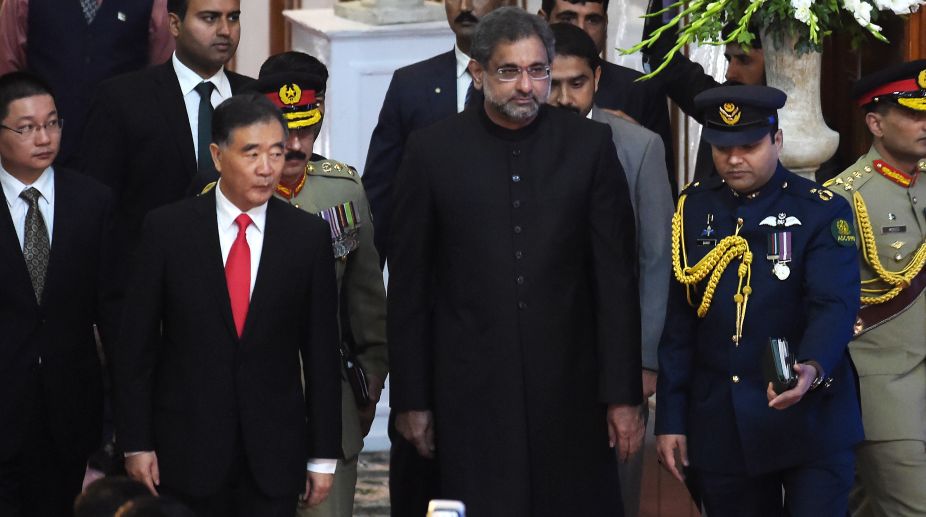Intel appoints Santhosh Viswanathan as India region head
Chip maker Intel on Friday said that it appointed Santhosh Viswanathan to head the India region business as its Managing Director (MD).

Prime Minister Shahid Khaqan Abbasi (Photo: AFP)
Pakistan today said that it cannot be a “scapegoat” in Afghanistan war and will not endorse any “failed strategy” that will prolong suffering of the people in the region, a month after US President Donald Trump warned Islamabad against providing safe havens to terrorists.
Addressing the UN General Assembly, Prime Minister Shahid Khaqan Abbasi claimed that there are no Taliban safe havens in his country.
Advertisement
“Having suffered and sacrificed so much due to our role in the global counter terrorism campaign it is especially galling for Pakistan to be blamed for the military or political stalemate in Afghanistan, Abbasi said in his address.
“We are not prepared to be anyone’s scapegoat. Taliban ‘safe havens’ are located not in Pakistan but in the large tracts of territory controlled by the Taliban in Afghanistan, he said.
Yes, cross border attacks do occur. These are mostly conducted by anti-Pakistan terrorists from ‘safe havens’across the border. To end all cross border attacks we ask the
Afghanistan government and the Coalition to support and complement Pakistans ongoing efforts to strengthen border controls and monitor all movement across it, Abbasi said.
However, he said that what Pakistan is not prepared to do is to fight the Afghanistan war on Pakistan’s soil. ”Nor can it endorse any failed strategy that will prolong and intensify the suffering of the people of Afghanistan and Pakistan and other regional countries,” Abbasi said in an apparent rebuttal of Trump’s new South Asia policy.
Trump in his new policy on Afghanistan and South Asia announced on August 21 warned Pakistan for its continued support to terrorist groups and warned Islamabad of consequences if it continues to do so.
Trump had also asked India to play a greater role in war-torn Afghanistan, much to the dislike of Pakistan.
Abbasi called for a priority on eliminating extremists, including from the militant Islamic State (IS) group and Al Qaeda, in Afghanistan.
“Pakistan believes that the urgent and realistic goals in Afghanistan should be: One, concerted action to eliminate the presence in Afghanistan of Daesh, Al-Qaeda and their affiliates including the TTP and Jamaat-ul-Ahrar, which was recently declared a terrorist organisation by the UNSC.
“Two, promote negotiations between Kabul and the Afghan Taliban in the Quadrilateral Coordination Group (QCG) or any trilateral format to evolve a peaceful settlement in Afghanistan. These two steps offer the most realistic prospect of restoring peace and stability in Afghanistan and our region, he said.
Abbasi said apart from the people of Afghanistan, Pakistan and its people have suffered the most from four decades of foreign intervention and civil wars in Afghanistan.
“These wars have blighted our country with the flow of extremists and terrorists, guns and drugs as well as an influx of millions of refugees. They have set back our economic development by decades. Even today, Pakistan is host to over 3 million Afghan refugees. No one desires peace in Afghanistan more than Pakistan, he said.
He said that from 16 years of the ongoing war in Afghanistan, it is clear that peace will not be restored by the continuing resort to military force.
“Neither Kabul and the Coalition, nor the Afghan Taliban, can impose a military solution on each other. The international community as expressed in several United Nations resolutions has concluded that peace can be restored in Afghanistan only through a negotiated settlement, he said.
Advertisement